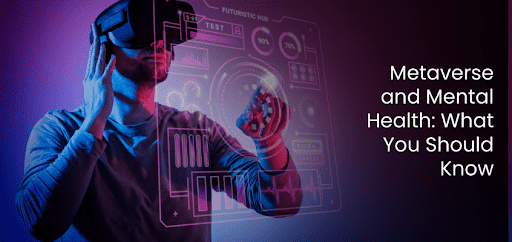Introduction
Social media primarily aims to bring people together, and it has done so in many ways. At the same time, studies claim that it has made us feel more alone and remote than ever. Social media interactions aren’t as genuine or rewarding as face-to-face communication. As social media users, we assume that we are engaging with friends or family while, in reality, we are at home and alone. Experts are becoming increasingly concerned about the Metaverse’s impact on mental health. Many concerns regarding the future of our mental health are arising as digital companies continue to expand their Metaverse platforms.
Our Wellness Programs
What is Metaverse?
We can perceive the Metaverse as a three-dimensional entity if we consider the internet two-dimensional. In the Metaverse, the employment of digital selves, or avatars, creates an immersive experience. The usage of augmented reality and virtual reality gives us the feeling of being “within” the internet, engaging digitally with other people, objects, assets, and places.
The Metaverse consists of three aspects:
- The V.R. interface
- Digital copyright to items in the virtual world
- Digital characters
The Metaverse attempts to be a world where we can live, interact and perform actions as we would in the physical world.
Looking for services related to this subject? Get in touch with these experts today!!
Experts

Kirti Bajpai

India
Psychologist
Experience: 5 years

Neelam Parwani

India
Life Coach
Experience: 5 years

Ritu Singh

India
Life Coach
Experience: 16 years

Davis Emerson

India
Psychologist
Experience: 6 years

SEEMA TANEJA

India
Psychologist
Experience: 30 years

Ruchi Garg

India
Psychologist
Experience: 6 years
How can Metaverse cause mental health issues?
Although technology has numerous advantages, studies say, it also has the potential to cause addiction and mental health problems in people. A whistle-blower from Meta says that the Metaverse will be addictive for its users. Addiction and mental illness have their origins in the brain. In addition, addictive drugs and behaviour trigger the brain’s pleasure centre. The brain and the individual gradually depend on that pleasurable experience to feel good. It eventually turns into an addiction that has adverse consequences.
Research papers from the internet have shown that addiction to the Metaverse can cause or exacerbate mental health issues like generated attention deficit and some disorders with sleep and diet, which leads to anxiety and signs of depression. Therefore, apart from a direct impact, this addiction has secondary effects on other mental health issues.
How can you protect yourself from your virtual self?
The best way to protect yourself is to “disconnect” from this virtual world. We must realise that we must not stay engrossed in the virtual world under the impression that we are building ‘real’ connections. We are simply engaging in a non-existent world. Instead, the primary focus should be on interpersonal and intrapersonal relationships in the tangible world.
Social media interactions aren’t as genuine or rewarding as face-to-face interactions. We may get cut off or distanced from our physical and social circle by engaging virtually with friends or family. It is the case with many other social games, isolating the user due to a lack of genuine human interaction. It is crucial since loneliness may increase or contribute to mental health difficulties and addiction. It is not to say that we shouldn’t use the Metaverse entirely – moderation is vital.
How to overcome mental issues caused by Metaverse?
It is critical to recognise the seriousness of digital addiction and get treatment from an addiction specialist if you or a loved one is suffering from it. If you’re having trouble controlling or abstaining from internet usage on your own, you can visit a physiatrist for help and consultation.
Group therapy or mutual aid groups can also be beneficial in reducing feelings of isolation, increasing support, and learning recovery strategies. Depending on the severity of the digital addiction, some people may benefit from 28 days or more of inpatient treatment to help lay the groundwork for their recovery before working with an addiction therapist on an outpatient basis. The 21-day habit-making rule helps break the chain of addiction, and it helps nullify the absence of the digital screen quickly.
Conclusion
The discussion on Metaverse Vs, Mental health issues are gaining prominence globally. Metaverse will usher in a technological revolution, bringing many benefits such as reduced carbon emissions, medical breakthroughs, immersive educational experiences, etc. However, like with other technologies, many people may be vulnerable to digital addiction and negative mental health consequences, as we now have internet Addiction Disorder and other technological addictions. Like present digital experiences, Metaverse might present the guise of genuine connection even when an individual is alone and meaningful interactions are absent. We can claim that the Metaverse is no different and that it will only be a matter of time before we fully integrate it into our life. On the other hand, there are claims that the Metaverse is so ground-breaking that it will alter society’s infrastructure, with severe implications for our mental health.
Genuine human involvement is crucial to our life with or without a Metaverse. If you feel low or think you need to talk with someone, feel free to reach out to the trained mental health professionals at United We Care.

















